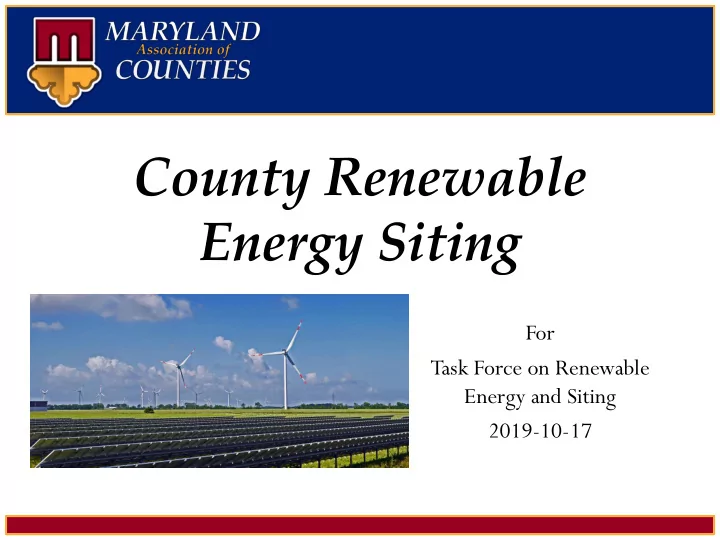

County Renewable Energy Siting For Task Force on Renewable Energy and Siting 2019-10-17
Climate Change & Renewable Energy Goals Current Climate Change Goal: 25% greenhouse gas reductions from 2006 levels by 2025. New Climate Change Goal: 40% greenhouse gas reductions from 2006 levels by 2030 with “aspirational goal” of 80% by 2050 Renewable Energy Goal: Clean Energy Jobs Act of 2019 requires 50% renewable energy by 2030 (14.5% solar) Clean Electricity Goal: Clean and Renewable Energy Standard (CARES) calls for 100% clean electricity by 2040 2
MACo Position on Solar Energy Siting MACo supports solar energy development with local zoning and siting requirements as part of the project approval process. MACo recognizes that there needs to be a mix of rooftop, community, and utility-scale solar projects to meet Maryland’s renewable energy goals and has established the following prioritization for solar projects: rooftop solar brownfields, grayfields (such as parking lots and warehouse rooftops), industrial areas, and appropriate government-owned lands (i.e., landfills and wastewater treatment plants); open space zoned for solar by local governments, with appropriate protections for prime farmland, forestlands, critical areas and wetlands, environmentally sensitive areas, and areas of cultural or historical importance. 3
MACo’s Record on Solar Energy Siting MACo became engaged on solar siting siting in 2016 MACo supported HB 1350 of 2017 as a Legislative Initiative Requires the Public Service Commission to give due consideration to a project’s consistency with local comprehensive plans and zoning, as well as the efforts of parties to address concerns raised by local governments (Bill passed) MACo supported HB 1588 of 2018 Removed a concern about unintended consequences of solar development under the “change or mistake” rule (Bill passed) MACo supported SB 744 of 2019 as amended by the Senate Would have established a Commission on the Development of a Blueprint for Solar Energy in Maryland (Bill failed in House) 4
MACo’s Record on Solar Energy Siting MACo opposed HB 627/SB 610 of 2019 Would have exempted solar equipment for utility scale solar developments from being subject to a personal property tax and instead required counties to collect an annual fee based on per megawatt capacity (bills failed – withdrawn) MACo has worked with counties on revising and updating their zoning to better manage utility scale solar facilities and advocated for the expansion of net-metering to encourage more mid-size solar projects on landfills or other county- owned lands Caroline, Harford, Kent, Montgomery, Somerset, Washington 5
Core Principles Renewable energy development similar to other forms of development – recognize has both pros and cons County zoning and revenue structures should be respected by both the State and renewable energy developers Renewable energy developers should reach out to affected county as early as possible Counties should provide certainty of process for renewable energy developers State role should be one of collaboration and not preemption One size does not fit all! 6
County Zoning Actions for Utility Scale Solar Projects Kent County was the pioneer Identify areas (by category or through plats) restrict or discourage solar development Identify areas (by category or through plats) to allow or encourage solar development Recognize grid connection & capacity Stakeholder process (Caroline, Queen Anne’s, Talbot) Moratorium (Caroline, Talbot, Frederick) Aggregate development caps (Caroline, Talbot) Project development caps (Frederick) Special exception requirement (Washington) Industrial zones (Carroll) 7
Help for Counties Education on regional (PJM) grid issues and project application process Relevant grid infrastructure data Best practices & examples for zoning & siting Clarity on State position for solar development State incentives & disincentives for solar development Renewable energy developer education Public education Funding Technical assistance 8
Contact Information Leslie Knapp Jr. Legal and Policy Counsel Maryland Association of Counties lknapp@mdcounties.org Phone: 410.269.0043 9
Recommend
More recommend